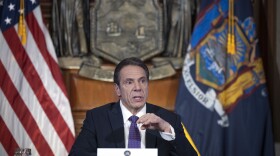The largest city in western Massachusetts is planning to personalize the grim statistics from the coronavirus pandemic.
The city of Springfield’s Health and Human Services Commissioner Helen Caulton-Harris said many people have told her about their loved ones who died from COVID-19 and with the permission of the families she is planning to share some of those stories on the city’s official website.
"Its important that we put a face to this virus and not just look at a number," said Caulton-Harris.
On Tuesday, at Mayor Domenic Sarno’s weekly update on the city’s response to the coronavirus pandemic, Caulton-Harris released a partial demographic breakdown of the 92 COVID-19 deaths reported in Springfield as of May 25th.
Forty-eight of the deaths, or 52 percent, were residents of a long-term care facility. Half of the city residents who died of the disease were white, 26 percent Hispanic, and 19 percent Black.
"I would very much appreciate if we were all able to work together to highlight some of the people in our community that we have lost," said Caulton-Harris.
Caulton-Harris said her department used death certificates and burial records to confirm the race and ethnicity of the COVID-19 victims. Statistics reported by the Massachusetts Department of Public Health have gaps because data about race and ethnicity was not collected from the onset of the pandemic.
The number of new COVID-19 cases and the number of deaths in Springfield has been declining at a mostly steady rate for three weeks.
"We are starting to see a decent or a good trend," said Sarno.
With barbershops, hair salons, car washes and curbside retail delivery among the businesses now allowed to reopen under the state’s phased restart, Sarno urged people to report any violations they see of the workplace safety rules.
" We need to know that so we can educate the residents and business community of the city of Springfield," said Sarno adding, " We are all anxious to reopen."
The number of patients hospitalized with COVID-19 and the average number of new daily admissions has declined at the city’s two hospitals to the point where both will begin scheduling some elective procedures this week.
These are limited to high priority preventative procedures, such as mammograms, and some surgeries that had been scheduled in March but were canceled when the pandemic hit, explained Nancy Shendell-Falik, president of Baystate Medical Center.
"Some people who may have been deemed elective back in March are now seeing their conditions change and now may not be just elective, but an urgent or emergency case and those we are open for as we speak," said Shendell-Falik.
At Mercy Medical Center, Dr. Robert Roose, the chief medical officer, said serum antibody testing is beginning to identify people who contracted the coronavirus but did not show any symptoms.
"We recognize that as businesses and activities begin to reopen this type of testing may be useful to understand the penitrance of the virus in the community as well as who may, or may not, have immunity to a future coronavirus infection," said Roose.
For now the antibody testing is limited to Mercy patients and selected staff who volunteer.









